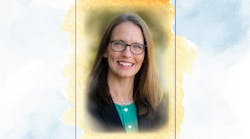Part of Mary Aufdemberg’s role at Daimler Truck North America (DTNA) is to develop the company’s product roadmap. That means looking into the future a bit to understand the evolution of fleet customer use cases for on-highway, medium-duty, and vocational trucking operations.
Today, Aufdemberg is DTNA’s general manager of product strategy and market development, but she started her career in customer research—buying junior dresses. So, how does one go from buying junior dresses to working in trucking you might ask? For Aufdemberg, it started at a young age.
She worked for an engine component company early in her high school and college years. In addition, Aufdemberg’s father is a mechanical engineer who began his career in Detroit designing engines for Ford Motor Co. Aufdemberg’s first real foray in the heavy-equipment space was during an internship at Caterpillar Inc. in Germany. From there, she joined Daimler Truck Financial Services in the company’s Chicago office and has been with DTNA for the last 18 years.
See also: Women in Transportation 2022: Trailblazers in trucking
“My passion is really connecting with customers, so early on, I spent a lot of time in customer research,” Aufdemberg told FleetOwner. “This is an industry where we work closely with customers, and it became a space that fit really well with my passions.”
When working with fleet customers, Aufdemberg and her team are meticulous in researching how fleets use their assets, driver and maintenance team needs, and, ultimately, what they need to run a successful business. DTNA manufactures Classes 5-8 Freightliner Trucks, Western Star Trucks for the vocational market, and Thomas Built Buses.
When Aufdemberg first joined DTNA, the OEM had just introduced the Freightliner Cascadia evolution for the on-highway segment. At the time—and like today—fleets were focused on increasing fuel efficiency to help improve their total cost of ownership. In turn, there was a big move toward vertical integration to have the most efficient powertrain and aerodynamics for the Cascadia, Aufdemberg said.
That was also the introduction of automated manual transmissions in the industry, she added.
“One of the big evolutionary technology topics since then has been safety,” Aufdemberg said. “As we started to get into the Detroit Assurance space and we saw the success in AMT, safety then became another really critical factor for society as well as our customers in terms of expectations for the truck, and it continues to be a space where we develop and pave the way for safety.”
See also: Fleet safety director: 'My passion is my superpower'
Aufdemberg was also involved in DTNA’s launch of the autonomous Freightliner Inspiration Truck in 2015 and is now helping the OEM embark on its zero-emission vehicle journey.
In addition to her day-to-day work with fleet customers, Aufdemberg is an active ally in the diversity, equity, and inclusion (DE&I) space both at DTNA and in her personal life. She serves as the executive sponsor of DTNA’s employee business resource group for LGBTQIA identities and sits on DTNA’s Diversity and Inclusion Council. Aufdemberg previously served on the board of directors of Women in Trucking for six years (2013-2019) and held the role of chairperson for five of those years.
“This is something I am extremely passionate about,” she said. “For me, it starts with connectivity between our employees and an aspect of feeling like you belong. If there is not acceptance or understanding for who we are at our core and respecting our differences, it can be really hard to come to a work environment and perform at a top rate.”
“Unfortunately, I know there is work that needs to be done everywhere to create that safe space for people,” Aufdemberg added. “There is great momentum at DTNA in this space, and I am really proud of the company and where we are continuing to go. For me, DE&I is a continuous journey and not a destination.”
DTNA, for instance, has an annual day of understanding where employees get together across the organization to talk about different DE&I topics. Managers and executive leadership throughout the organization also discuss biases and how to create inclusive meetings, Aufdemberg added. The key, she noted, is ensuring that everyone in the room feels comfortable and has a voice, and that managers are tapping into the skillsets and the knowledge from everyone, which has become especially important in today’s Zoom environment.
When it comes to recruiting more women into the industry, Aufdemberg suggested women interested in transportation find a support network.
“We don’t have to do this by ourselves.We can find people to support us along the way,” she urged. “I think the more diverse group we have to support us, the better and more effective we will be at growing it.”
As for recruiting the upcoming generations, Aufdemberg said they aren’t going to be raised thinking about getting into transportation. That, she said, is on industry leaders.
“[It’s] making sure that everyone who works here understands what a cool opportunity it is to work in this industry and what an impact we actually have in North America,” Aufdemberg added. “When we talk about purpose, I feel passionate that we can make an impact in society. So, how do we as an organization help individuals understand that’s part of what we do every day? That’s exciting as a leader.”




